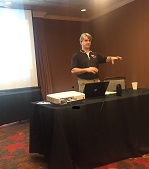Building a Better Voice
![]() Print this Article | Send to Colleague
Print this Article | Send to Colleague
It was
1:45 am at the Big Bar in January after a marathon day of sessions, networking
and smiles that accompany and energize professionals in our field year after
year. I was talking with some fellow conference committee veterans about
sessions, design, ideas for the future. From out of nowhere I uttered a phrase
that resonated with me all year, "...we need to build a better voice."  At the time I was referring to the idea of diverse speakers that are an acknowledged
and valued part of the tapestry of our profession, but then it occurred to me: I can
do that.
At the time I was referring to the idea of diverse speakers that are an acknowledged
and valued part of the tapestry of our profession, but then it occurred to me: I can
do that.
As a member of the faculty at Chicago State University, I am fortunate to be teamed with exceptional professional educators with experiences from a rich variety of backgrounds. More importantly, I have the ability to engage an ongoing speaker development process in my students.
Chicago State has a widely diverse recreation program drawing enrollments from non-traditional students, single parents, traditional students and a wide array of economic and cultural backgrounds. Our classes are rich with growing potential of these students who need experiences professional’s advise academics to insinuate into our programs, and encouragement through academic pursuit to unlock solutions to professional issues through steady investigation and results-based professional practice.
This is a dream, a perfect scenario goal and not easy to break down into digestible progressions that will sustain into their professional world. However, in working together, the faculty has made a commitment to engage students in a systemic process that helps build the better voices we hope to hear.
It starts with course topic development and committing to refining presentation skills in many courses. As a student progresses, they refine their presentations and are challenged to find different lenses to apply the knowledge of their interests. We reinforce attendance at professional conferences and most importantly, co-presenting topics with one of the educators or a professional mentor.
Recently, 10 students presented at the Midwest Symposium on Therapeutic Recreation on the following topics: Therapeutic Benefit of Baby Sign and Alternative Communication, Virtual Reality Video Games As Treatment For PTSD, The Benefits of Dog Therapy programs, Parallel Play and Theme Design in Cinema Therapy, How to Develop Rapport Equity, and Paralympic Bocce. Students benefited from investigating professional contacts to reference and meet with in their presentation development, were challenged on their development through peer evaluation, self-evaluated their own video presentation prior to attending the professional conference, and as a group, stayed accountable to each other for helping design the sessions to be informative, interactive and engaging.
Some of their feedback after the conference was inspiring:
- "You believed in me when I didn’t believe in myself. You understood me when I wasn’t sure about anything!" – Nancy D.
- "Mr. Mac, you really helped me see the levels this topic goes through. When we first talked about it last year it was an interesting topic, now it is my professional passion. I think we have the beginnings of a professional networking group to advocate for getting resources our veterans need and deserve" – Gerald M.
- "We also had a fun and engaging feel that the audience fed off of. Marquis was leading the engaging a lot like an emcee, speaking in a comfortable and entertaining manner. We also had the demonstration of our professor and colleague showing how much fun the game was even in the restrictive environment of teaching progression.
- Our knowledge of nuances helped again with showing our expertise, being able to explain equipment and it’s pricing" – Phil E.
Finding their voices, advocating for others, inspiring new program design and engagement with the communities they serve. They are considering presenting on these topics at ATRA in September, and through IPRA committee involvement, should they be selected next January. Ten new voices in our profession looking to engage develop and share with other networks ideas they are passionate about. These are important ideals in our profession, and we have built new and better voices from diverse backgrounds to share in our beautiful and enlightened future.
Professor Michael McNicholas, CTRS
Chicago State University
